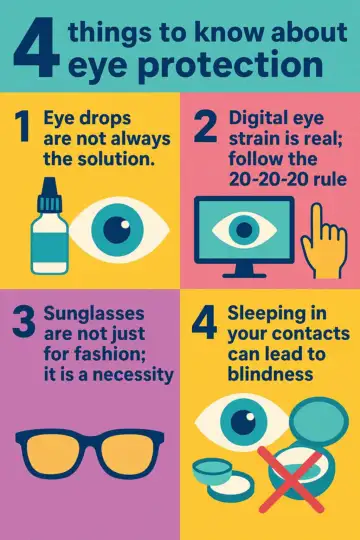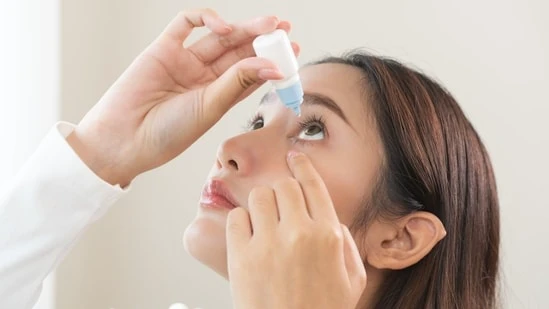Are you also one of those people who reach for a over-the-counter prescribed eye drops whenever you feel some irritation? Or do you spend a considerable amount of time in front of the screen without taking any breathers in between?
If your answer is yes, then you may be unknowingly harming your eyesight.
Dr Chetan, MS ophthalmology (PGI Chandigarh) and consultant at ASG Eye Hospital, Noida, in an Instagram post shared on October 10, highlighted 4 things everyone should know about protecting their eyes for life. He listed a few everyday habits that we practise without knowing the harm they cause. Let’s learn all about them:
4 things to know about eye protection
Sharing the post, Dr Chetan stressed that as an ophthalmologist, he warns against practises like digital strain, using eye drops without consulting doctors, avoiding sunglasses, and more every single day to his patients. “As an ophthalmologist, I explain these things every single day. Here are 4 things you must know to protect your eyes for life,” he wrote.
1. Eye drops are not always the solution.
According to the ophthalmologist, eye drops are not the solution to every eye problem that you have. Some ailments require consultations with an expert.
In an interview with HT Lifestyle, Dr Jai Kelkar, ophthalmologist, director, NIO Super Specialty Hospital, warned, “Steroid or antibiotic eye drops without a medical prescription or supervision can increase the risk of developing cataracts, glaucoma, or even drug-resistant infections.” Learn more here.
2. Digital eye strain is real; follow the 20-20-20 rule.
If you spend a lot of time in front of the screen, because of your work or projects, it is important to take breaks in between to avoid digital strain. Dr Chetan recommends following the 20-20-20 rule.
The 20-20-20 rule is a method to prevent eye strain from screen use: every 20 minutes, look at something 20 feet away for at least 20 seconds. This simple guideline helps relax the eye muscles, which can become fatigued from prolonged near-focusing on a digital device.

3. Sunglasses are not just for fashion; it is a necessity.
The ophthalmologist recommends wearing sunglasses for eye protection. According to the Nevada Cancer Coalition, wearing sunglasses prevents skin cancer and other eye-related health issues. The skin around the eyes is some of the thinnest and most delicate on the body, making it particularly susceptible to UV damage. Therefore, wearing sunglasses protects from any damage.
4. Sleeping in your contacts can lead to blindness.
Lastly, Dr Chetan warned against sleeping with your contact lenses on as it can lead to blindness. Moreover, wearing contact lenses while you sleep increases the risk of eye infection, particularly microbial keratitis. This can cause vision loss and permanent scarring, per the Michigan Eye Institute.
